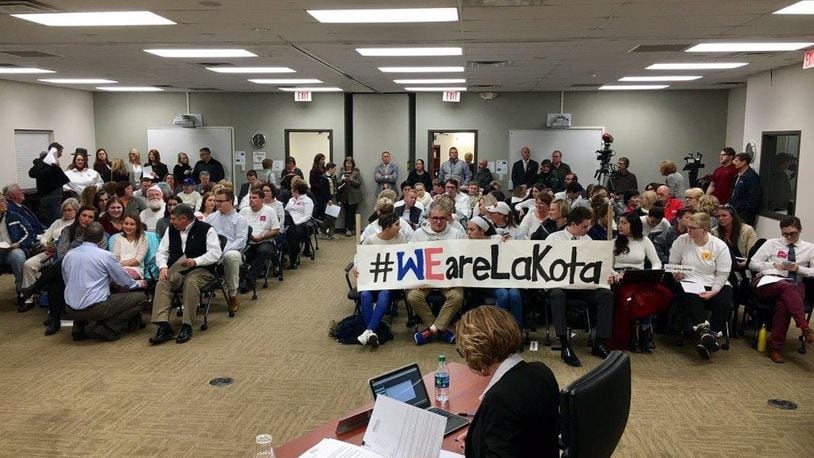The Lakota Outreach, Diversity and Inclusion (LODI) department’s responsibilities will include “reviewing current administrative guidelines and procedures already in place that protect Lakota’s most vulnerable students.
“They will collaborate with staff, students and content experts to study current practices and then introduce measures that help ensure district-wide consistency and transparency in implementation.”
In December the Lakota Board of Education narrowly defeated a hotly debated proposal that would have dramatically expanded the district’s current policies regarding how the its 22 schools, staffers, students and others would accommodate and interact with transgender students.
The board’s public meeting was attended by a sizable number of Lakota LGBT advocates — including parents of transgender students, school staffers and others — who had drafted the broader, proposed policy and lobbied board members for its passage.
Despite their efforts, the board voted 3-2 against changing the district’s current policies, which already include provisions and recommendations to ensure transgender students are not bullied, have access to non-gender specific school restrooms and other accommodations.
Lakota Superintendent Matt Miller said Friday the new department “will be responsible for diving into the day-to-day implementation of policies and guidelines already in place to protect all of our students. They will then recommend to me how to improve the experience of students and build a consistently inclusive environment district-wide.
“This is another step we are taking to ensure that all of our students feel safe, secure and supported while at school. We have no choice but to help facilitate tolerance and acceptance so that students can focus on learning.”
The day after the school board’s Dec. 11 vote, Lakota officials, who oversee Southwest Ohio’s largest suburban district of 16,500 students, reacted to a large number of social media postings and comments regarding the board’s actions.
They issued a public statement Dec. 12 assuring transgender students they would continue to be provided the protections and accommodations already required by the district’s policies.
Lakota officials said Friday, “the Lakota Board of Education does not anticipate another vote on a policy dedicated to gender identity and expression in the near future.
“Instead, the district has charged the LODI department to not only study, but recommend changes to existing administrative guidelines. This may include the recommendation of additional professional development for staff, students and community members and other measures to more fully and consistently meet students’ needs.”
The creation of the new district department does not require approval by the school board.
Board member Todd Parnell, who voted against the proposed policy last month, said, “I think the new LODI is a great idea. It is not just about the transgender issue but a much more broad spectrum of inclusion.
“Inclusion needs to mean everyone. We cannot enact policy that gives special rights to any group at the infringement upon the rights of the majority.”
Lakota special education teacher Emilly Osterling, who is also chair of the National Education Association Gay, Lesbian, Bisexual and Transgender Caucus, was among the leaders pushing for a new policy.
Though she was not immediately available to comment Friday, she said last month after the policy change was rejected that she was disappointed.
“Lakota has already been accommodating these students for years. However, policy is necessary because it guarantees that the district will continue to acknowledge this student population and their needs despite change over in staff and administration,” Osterling told this news organization at the time.
“The (proposed) policy isn’t about restrooms, it’s about removing social stigma, educating the public about gender identity, creating safer and more inclusive classrooms and telling our transgender students — we see you.”
About the Author
